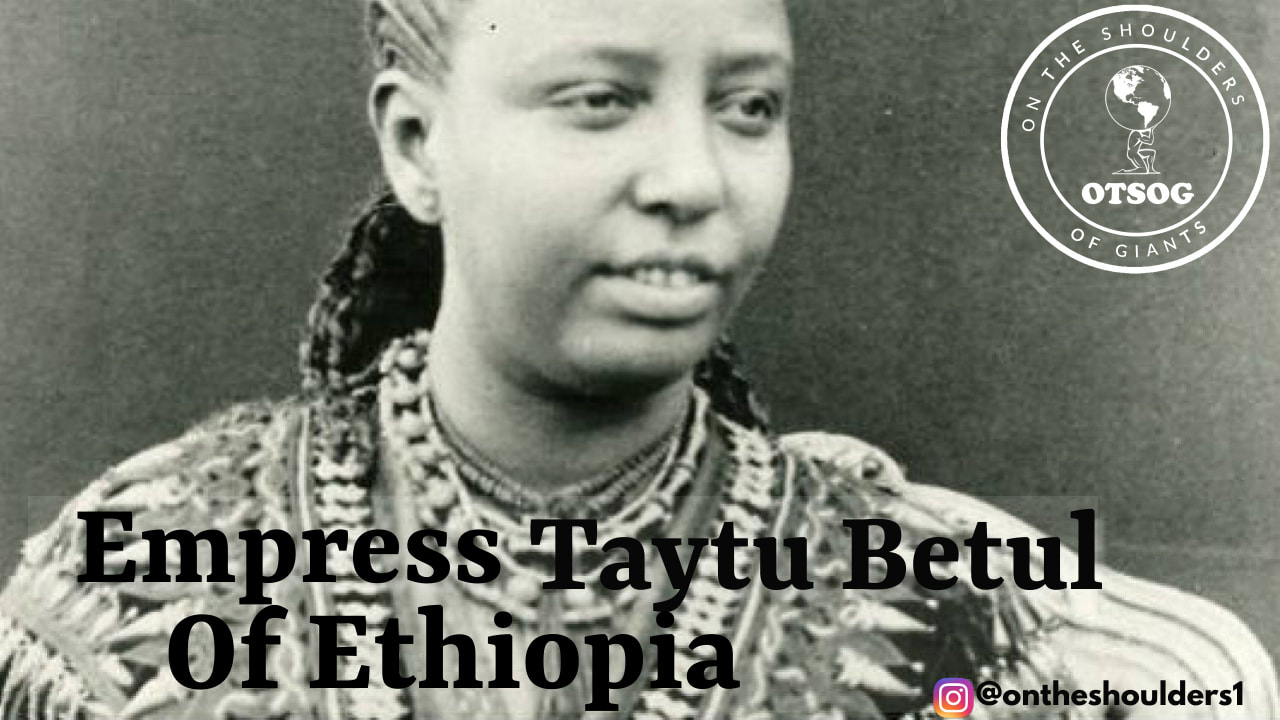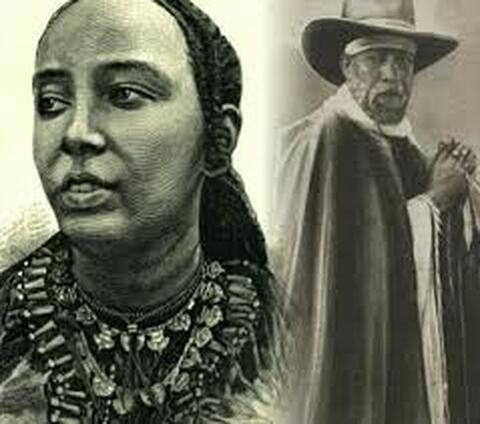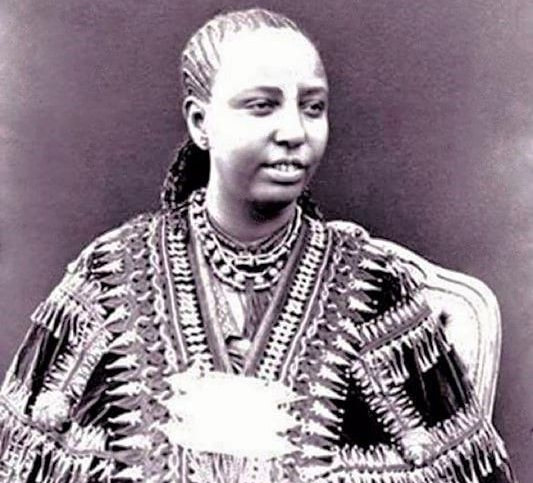|
Around the year 1851, an Ethiopian Nobel family who were descendants of royalty, Ras Betul Haile Maryam and his wife Yewibdar, gave birth to their third of four children Taytu Betul Hayle Maryam, a little girl who would grow up and become a legendary Ethiopian ruler. Taytu was born within the Oromo Ethiopian Empire and is linked to the Solomonic dynasties. It is said that as a young girl she was subjected to female genital mutilation which left her unable to bear children. Within the first month of her birth, she was baptized and given the baptismal name of Walatta Mikael. Around 1853, Taytu’s father died from lingering battle wounds, after a while, her mother remarried a man who was an administrator for the monastery in Debre Mewi, this is the location many people believe Taytu received her education. It was not common for Ethiopian women to receive an education at that time but Taytu was the exception, she could read and write in the Amharic language and could even understand the Ge’ez language. She was remarkably gifted, her hobbies were playing chess, writing poetry, and playing instruments such as the begenna and the lyre; both the begenna and the lyre are string instruments similar to a guitar. Around the age of ten, Taytu was married to her first husband, a marriage that was not ideal or even lasting. Information suggests that her first husband committed a crime and was punished but Taytu was forced to experience her husband’s punishment with him. It is said that her second marriage ended after she was beaten by her husband. When she left him she was able to take a good portion of his wealth and servants with her. She would marry and divorce once more before she was married to the prominent Menelik II of Shewa, who would eventually become the Emperor of Ethiopia. At the time of Taytu and Menelik’s marriage, Melelik was heir to the Ethiopian Empire that was ruled by Tewodros II. It took around ten years before Menelik was able to escape the rule of Tewodros and eventually be named the ruler of Shewa in 1865. Taytu was an asset to the Ethiopian empire because of her brilliance as a leader which was displayed before and after her marriage to Menelik. She was able to deny the idea of reconstructing Ethiopia by a group of people considered progressive. With Taytu at his side, Menelik would be able to become Emperor of Ethiopia and build a powerful independent African Empire. Because of her brilliance and bravery, Menelik would consult Taytu about matters that concerned his Empire, he believed in her and knew she would not betray him or their people. Menelik built partnerships with Italy and France who were looking to take control of African countries before the British were able to. With Italy and France considering Menelik as an Ally, Italy was also plotting on encroaching on Ethiopian land and eventually taking over, but not on Taytu’s watch. The Italian army was stationed along the border of Eritrea and had begun to move inland but Taytu was not going to sit back and watch her people be conquered. Menelik II officially became the de facto Emperor of Ethiopia in 1889 and immediately began to improve his empire. Menelik was influenced by Taytu to found the eventual Ethiopian capital city of Addis Ababa in 1886; a location that was chosen by Taytu. Menelik and Taytu went on to upgrade the empire by adding modernized roads and bridges, allowing them to be able to travel easier and engage in more trading. They implemented a tax system, created railways, a national bank, telephone service, hospitals, a medical system, a postal system, an updated education system, they even established a new system of currency within the empire. Ethiopia was an empire that was able to compete with the rest of the modern world. Menelik’s power was challenged by rebel forces led by a man named Zegeye while he was away with most of his Army, Zegeye saw this as an opportunity to possibly seize power, he was not prepared for the bravery of the Empress of Ethiopia. Taytu received a letter stating that the capital city at the time Yejju would be overrun by rebel forces because the Empress did not have enough troops to fight back. Taytu wrote a letter back to Zegeye and the rebel forces, she also sent three hundred troops to defend the capital city. She replied to them stating that she doesn’t want to have an armed conflict with Zegeye, but if he decided to disrespect the empire she would become his mortal enemy and bring warfare to his front door. The rebel troops were afraid to attack the capital city and were eventually turned away by the royal troops who even captured some of the rebels. With or without her husband being present, Taytu was not one to be messed with. In 1889, Taytu played a huge role in the dissolving of the Treaty of Wuchale which Menelik signed with Italy, a treaty that was supposed to create a working relationship between Italy and Ethiopia. The problem with the treaty is that it was written in two languages, Italian and an Ethiopian language, the Italian version gave Italy legal power and control over Ethiopia. When Taytu learned of this she tore up the treaty and it led Menelik to declare war against Italy. Menelik and Taytu led one-hundred thousand forces against seventeen thousand Italian troops; the Italians would underestimate their African foes. Menelik ordered the first attack on the Italian forces but was unsuccessful in this attempt. Taytu devised a plan to cut the Italian water supply at the fort they were occupying. For nine days the fort was under siege with its water supply cut, the troops were forced to surrender and the Ethiopians took the fort. The Battle of Adwa began in 1896. Led by Menelik and Taytu, the Ethiopian forces were able to use strategy and force to outsmart and outgun the Italians who suffered a great defeat. The Ethiopian victory over the Italians made front-page news worldwide embarrassing Italy. At that time not many African nations were victorious over European nations, also if an African nation was victorious it was not public news. Many European news outlets spread lies about Menelik and Taytu making them look like blood-thirsty monsters, but they were actually African leaders who defeated a “mighty” European nation. Many European nations resented Taytu because she convinced Menelik to defend his land and people rather than just become allies to European nations. I say she did what any self-respecting ruler would do, not sell out to their enemies. Menelik II suffered a major health issue in 1906 amid Tatytu tirelessly working to preserve her family’s power. Menelik named his grandson Iyasu his successor before dying in 1913. Iyasu was eventually replaced by Taytu’s granddaughter Zautitu as Empress of Ethiopia. Tatyu died in 1918, leaving a great legacy of helping Ethiopia become an African power under the rulership of Menelik II. She was able to uplift her nation, defeat a European nation, and empower black women all over the world. Taytu Betul Hayle Maryam, we proudly stand on your shoulders. J.A. Ward Click here to learn more about the On the Shoulders of Giants book series!!!
1 Comment
NannieNajwa
10/23/2020 09:49:36 am
Empress Taytu
Reply
Leave a Reply. |
Details
Categories
All
Click Here to join our mailing list
|
Contact Us: |
Connect With Us |
Site powered by PIT Web Design




 RSS Feed
RSS Feed



